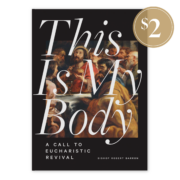When I worked in the anthropology division at a natural history museum, I made no secret of my Catholic faith. Though many of my colleagues and mentors were atheist or agnostic, they were also broadly tolerant; some were even quietly curious about my religious beliefs. However, in the wake of the Dobbs v. Jackson Supreme Court decision, I was saddened but not very surprised to see many anthropologists and paleontologists march in lockstep with the radical pro-abortion view. Almost without exception, they proclaimed access to abortion to be nonnegotiable and insisted that fetuses are nonpersons without rights.
These are smart and talented scientists who I knew to be decent and kind people. How, I wondered, could they reject out of hand the fundamental right to life of pre-born humans? Perhaps, it was loyalty to a progressive political ideology, but this explanation seemed somehow incomplete. Could there be a deeper philosophical misunderstanding at play? I took these questions to the Lord in prayer and, in my time meditating on them, some possible answers occurred to me.
Every man, woman and child (born and pre-born) is made in the image and likeness of God and thus has unfathomable dignity.
Many people in the West—both inside and outside academia—subscribe implicitly to a scientistic (as distinct from scientific) view of reality. Scientism rejects any claims that theology or philosophy may make concerning a transcendent meaning or purpose to the universe. Such a worldview will lead, in due course, to the belief that all life forms are merely the transient epiphenomena of the mindless processes of physics and chemistry. By this logic, of course, no individual human life has intrinsic meaning or value. Hence, “unwanted” humans (such as pre-born humans who are the result of “unplanned pregnancies”) can be disposed of without qualms. After all, their lives have no eternal significance—indeed, no significance at all in the face of an unfeeling, meaningless universe.
In the wake of the Dobbs decision, one atheist meme that recently made the rounds on social media openly scoffed at the idea of human life having cosmic significance: Why would an omnipotent God create a mind-bogglingly vast universe populated with trillions upon trillions of stars and planets just to have a personal relationship with you and me? And yet, it’s true—we all have cosmic significance. Every single human being is loved by God, who loved the entire cosmos into existence.

The Judeo-Christian tradition, of all the world’s competing religions and philosophies, proclaims unequivocally and for all time that every single human life is important. You and I were loved into existence; we were known before the foundations of the earth were formed, before a single star was ignited, indeed before the Big Bang itself. And if there are other people living on other worlds out there in the vast ocean of stars, then God knows and loves them too. We are all children of one Father.
Skeptics may insist that life is the inevitable byproduct of blind chemistry, yet despite all we’ve learned about evolutionary biology in the past one hundred and fifty years, the origins of life remain tantalizingly mysterious and frustratingly opaque. For all their technical prowess, biochemists have yet to create life from non-life in a lab. Was the origin of life a miracle? Who can say? Yet, in a fundamental way, every human being is a miracle because each human being is a body-soul composite. Even though our bodies may have been created from material that developed over four billion years of evolution on this planet, each individual human soul is the direct, miraculous creation of God. In this way, every man, woman, and child (born and pre-born) is made in the image and likeness of God and thus has unfathomable dignity.
Yet we mustn’t fall into the error of thinking that only the soul has value. The Gnostic heretics viewed the spirit as holy but physical matter as corrupt and evil. They were wrong. The agnostic astronomer Carl Sagan was, ironically, closer to the truth. He said, “We are made of star-stuff.” And he was right—the atoms that make up our bodies were forged in the nuclear furnaces of ancient stars. Isn’t that glorious? Aren’t we, as the Psalmist proclaims, indeed “wondrously made”? (Psalm 139:14) To ponder the marvelous processes God employs to generate every single human life should move us to be overcome with awe and profound respect.

But when the culture at large denies the incredible truth that we are wonderfully made, respect for the most vulnerable of human lives evanesces in short order. When the culture denies that human beings have an intrinsic worth and are all equally God’s children, then on the individual rests the terrible choice either to despair or to forge their own subjective meaning and sense of identity. And so, we have seen the rise of postmodern radical individualism and the demand for absolute bodily autonomy among the rank and file of pro-abortion activists.
As the old saying goes, ideas have consequences. When a philosophy that proposes a godless universe gains traction in society, then the God-given rights to life, liberty, and the pursuit of happiness enshrined in America’s Declaration of Independence cannot long endure. The Dobbs decision is a step in the right direction, but only a step. Now the hard work begins of convincing the wider culture of the sanctity, and cosmic significance, of every human life.
